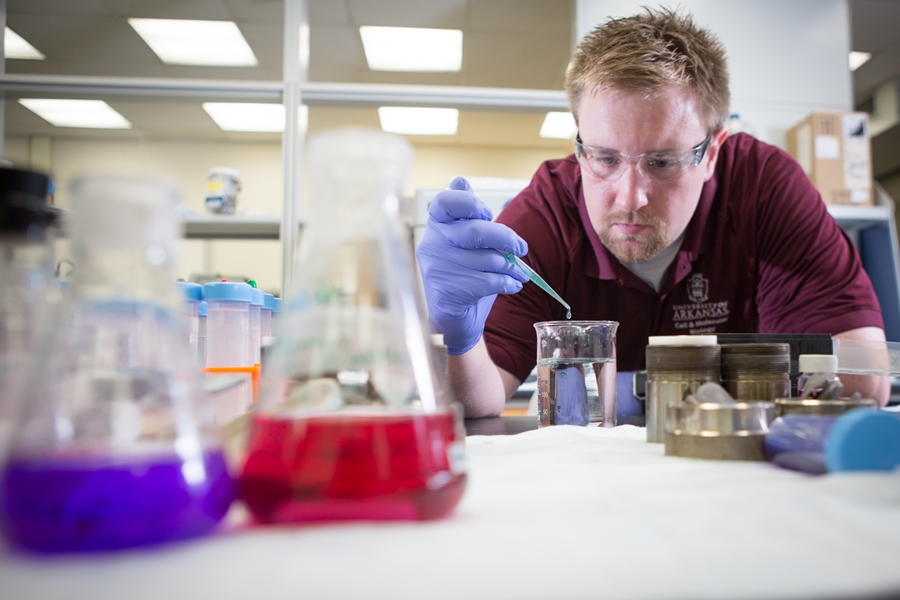
For most graduate students, attending to the demands of their coursework and dissertation research is time-consuming enough to occupy nearly every waking hour of the day. However, Parker Cole is not a typical graduate student.
Cole, a first-year doctoral student in the cell and molecular biology program, currently has three research projects on his plate and a fourth in the works. He is using nanobiotechnology to find solutions for some of today's most pressing health-related challenges.
His dissertation research is centered on combating food contamination at the industry level, resulting in fewer consumer-contracted foodborne illnesses. He is working to create surface coatings for industry equipment, like conveyor belts and water reservoirs, which would destroy the contaminants during processing.
As part of developing these antimicrobial textiles and materials, Cole is trying to discover the longevity of their activity.
"It's important to know how long it takes these microbes to develop resistance, so a time frame can be established for when new materials need to be created," he said.
As a side project, Cole spends his time finding ways to improve cancer medications. According to Cole, many drugs used to treat cancer would be more convenient for patients to take orally. However, metabolic nuances, such as the acidity of the stomach environment, present barriers for the drugs' ingestion.
The Doctoral Academy Fellow and his team of eight undergraduate researchers are developing a delivery platform that can control the drugs' release rate, protecting the drugs until they reach the small intestine.
"The delivery platform we are developing will make the medications much more patient-friendly," Cole said.
In addition to advancing cancer research, Cole is working to battle neurodegenerative diseases. Some treatment options for patients with these conditions involve replacing dead or disease-effected neurons with neuronal stem cells. The problem is only 15 percent of the neuronal stem cells actually differentiate into neurons, which are the conductive cells needed within the neurological system.
"The goal is to increase the conversion rate, so more neurons are produced," Cole said. "That will allow for a greater number of therapeutic options for patients with neurodegenerative diseases and other illnesses affecting the nervous system."
Cole acknowledged his many projects can, at times, seem taxing. However, his heart for people and passion for solving problems drive his dedication to research. He also makes it a priority to surround himself with people who help him stay focused.
"When you're passionate about something, the work is enjoyable," he said. "But, I definitely couldn't do this on my own. My advisers, Ryan Tian and Franck Carbonero, are very supportive and help me balance my time. My undergraduate team definitely keeps me in line, and my fiancé keeps me grounded and provides a sort of checks and balances for all my projects."
The Lonoke, Arkansas native may only be in his first year of graduate school, but he has no intention of stopping his education after completing his doctorate. He said he intends to pursue a master of business administration, so he can further his professional goals of integrating science and technology with business. Cole has already begun gaining experience in this area through an internship with Nanomatronix, a local nanomaterials and microelectronics start-up.
"I would really like to take academic research with potential viability in industry and provide an environment for that technology to be cultured, rather than just letting it sit around in a publication," he said. "My experience with Nanomatronix has allowed me to pursue my passion early in my academic career. Matthew Leftwich, the company's founder, has been a phenomenal mentor and colleague."
Cole said the cell and molecular biology program has been a great fit for his research mindset, and his experiences in the program have been invaluable in helping hone his skills as a researcher.
"I have a very integrative mindset, and the cell and molecular biology program has really provided me the opportunity to tap into that and pursue cross-disciplinary coursework in a non-static environment," he said. "I couldn't have found a better opportunity for myself."
Contacts
Amanda Cantu, director of communications
Graduate School and International Education
479-575-5809,